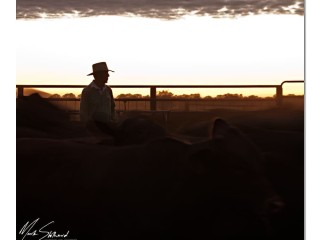 A senior rural financial counsellor who has been working in the Northern Territory for the past week says the severity of the financial turmoil created by the live export ban is worse than she had imagined.
A senior rural financial counsellor who has been working in the Northern Territory for the past week says the severity of the financial turmoil created by the live export ban is worse than she had imagined.
Kay Matthias is the general manager of the federally-funded Rural Financial Counselling Service based in South Australia.
She travelled to Darwin with fellow financial counsellor Charlie Goode last week in response to a Northern Territory Government request to provide financial counselling assistance to producers and rural businesses affected by the live export crisis.
Mrs Matthias said she was now in the process of appointing a full-time counsellor to the Northern Territory in response to the demand that now exists for rural financial counselling services.
She said the crisis had pushed many businesses to the financial brink.
“It is getting worse by the day,” she said.
“It is some time since there has not been any income, and then there are other significant factors like their health, the health of the animals that are left, mortality rates are likely to rise.
”There is a whole ripple down effect from this, and it is not just about the lack of immediate income, it is the effect it will have medium and long term as well.
“We appreciated what the situation probably was, but we didn’t realise it was quite as severe as it is."
The counsellors work with producers and other affected businesses to manage the immediate issues that arise from having no income, and negotiate on their behalf with creditors to ease pressure on debt servicing arrangements.
The counsellors can also help businesses to identify and apply for the funding support that is available. The services are provided free of charge and are confidential.
Mrs Matthias said from her experience banks and financial institutions were generally as lenient as they could be in crisis situations such as this.
The important message for businesses experiencing financial difficulty was to communicate with their lenders.
“They tend not to do that,” she said. “When they’re under stress, they tend to go into their shell, and they often don’t respond if a bank rings them or sends them a letter.
“So that is very much a role we play to be that conduit between a producer and a bank, so the pressure is off them and they don’t have to deal with that as well.
“In the main we find banks are very, very good in a situation like this, but there comes a point in time where they have to work out where they have to go in future as well.
“It depends on how long this lasts as to what position the banks will take, but certainly in the short term I think we will find banks will be very lenient around servicing debt.”
The Rural Financial Counselling Service can be contacted by calling 1800 1800 836 211. Counsellor Charlie Goode, who is also an experienced cattle producer, will be working between Darwin and Katherine for the next month and can be contacted directly on 0418 850 251.
